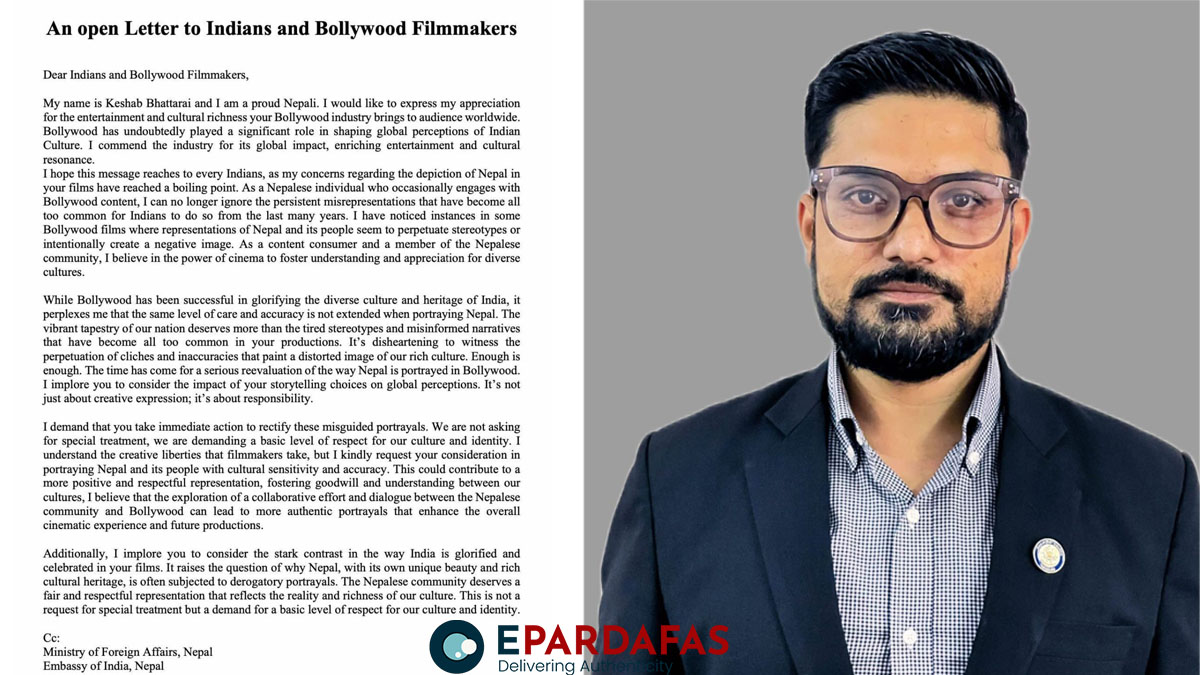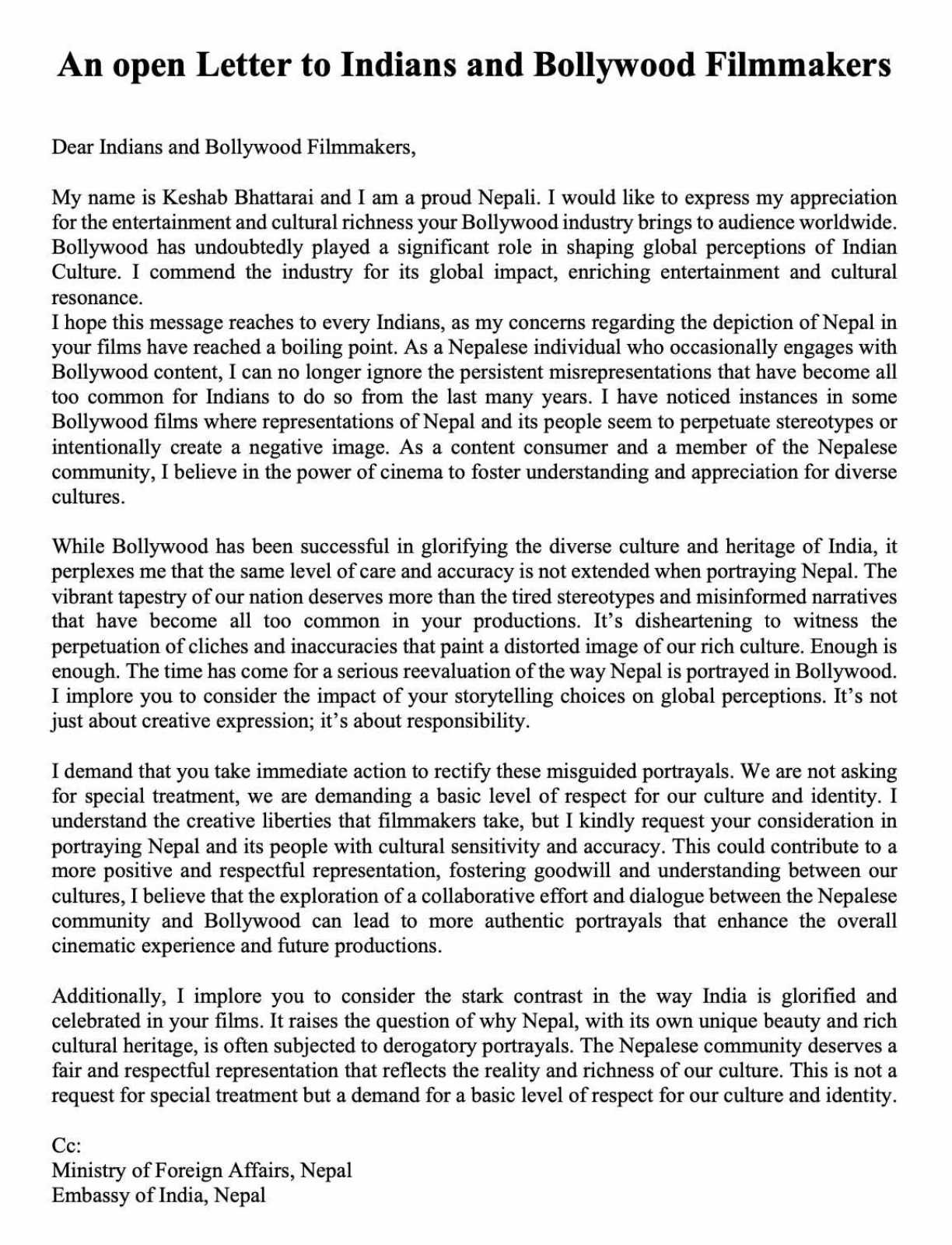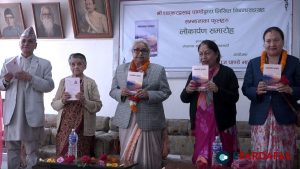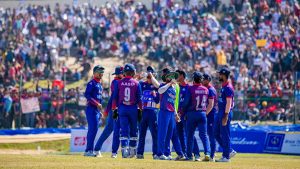
Nepali Advocate Keshab Bhattarai Urges Bollywood for Accurate and Respectful Portrayals

In a passionate and articulate open letter addressed to Indians and the esteemed filmmakers of Bollywood, Keshab Bhattarai, a distinguished Nepali advocate, has drawn attention to the persistent misrepresentation of Nepal in the Indian film industry. As a proud Nepali who recognizes and celebrates the global impact of Bollywood in shaping perceptions of Indian culture, Bhattarai emphasizes the need for a nuanced and accurate portrayal of Nepal and its people.
Background: The Power of Bollywood on Global Perception
Bollywood, renowned for its vibrant storytelling and cultural richness, has undeniably become a global cultural phenomenon. Its influence extends far beyond India’s borders, captivating audiences worldwide with its elaborate dance sequences, compelling narratives, and the celebration of diverse Indian traditions. However, this widespread impact also carries the responsibility of shaping international perspectives on South Asian cultures, including that of Nepal.
Appreciation and Concerns: An Open Letter
In his open letter, Bhattarai expresses gratitude for the entertainment and cultural richness that Bollywood brings to audiences globally. Acknowledging the significant role Bollywood plays in shaping global perceptions of Indian culture, he commends the industry for its global impact and enriching entertainment.
However, the tone of the letter takes a serious turn as Bhattarai addresses his concerns about the depiction of Nepal in Bollywood films. As a consumer of Bollywood content and a representative of the Nepalese community, he can no longer ignore the persistent misrepresentations that have become all too common in recent years.
Instances of Misrepresentation: Perpetuating Stereotypes
Bhattarai points out specific instances in Bollywood films where representations of Nepal and its people perpetuate stereotypes or intentionally create a negative image. This includes the portrayal of Nepali characters, cultural practices, and the depiction of Nepal’s landscape. As a content consumer and a member of the Nepalese community, Bhattarai believes in the power of cinema to foster understanding and appreciation for diverse cultures.
A Call for Responsible Storytelling: Cultural Sensitivity and Accuracy
“While Bollywood has been successful in glorifying the diverse culture and heritage of India, it perplexes me that the same level of care and accuracy is not extended when portraying Nepal,” laments Bhattarai. The vibrant tapestry of Nepal, with its unique cultural heritage, deserves more than the tired stereotypes and misinformed narratives that have become all too common in Bollywood productions.
Bhattarai emphasizes that it is not just about creative expression; it’s about responsibility. He implores Bollywood filmmakers to consider the impact of their storytelling choices on global perceptions. The letter is a heartfelt plea for a serious reevaluation of the way Nepal is portrayed in Bollywood, demanding a basic level of respect for Nepalese culture and identity.
Demand for Immediate Action: A Call for Respect
The letter goes beyond a plea; it is a demand for immediate action to rectify these misguided portrayals. Bhattarai clarifies that the Nepalese community is not seeking special treatment but rather a basic level of respect for their culture and identity. While understanding the creative liberties that filmmakers often take, he kindly requests consideration in portraying Nepal and its people with cultural sensitivity and accuracy.
Collaboration and Dialogue: Building Authentic Representations
In a constructive appeal, Bhattarai proposes the exploration of a collaborative effort and dialogue between the Nepalese community and Bollywood. This collaborative approach aims to lead to more authentic portrayals that enhance the overall cinematic experience and future productions.
He envisions a positive outcome where the exploration of cultural nuances and dialogue between the two communities contributes to a more positive and respectful representation. Such an approach, Bhattarai believes, could foster goodwill and understanding between the Indian and Nepalese cultures.
Contrast in Portrayals: A Question of Fairness
Bhattarai doesn’t shy away from pointing out the stark contrast in the way India is glorified and celebrated in Bollywood films. This raises a fundamental question about why Nepal, with its own unique beauty and rich cultural heritage, is often subjected to derogatory portrayals. The Nepalese community, Bhattarai asserts, deserves a fair and respectful representation that accurately reflects the reality and richness of their culture.
Conclusion: The Way Forward
As the debate continues to unfold, it remains to be seen how Bollywood filmmakers and the Indian film industry respond to this call for change in the portrayal of Nepal in their productions. Bhattarai’s open letter serves as a catalyst for reflection and dialogue, urging the industry to consider the broader implications of its creative choices on global perceptions.
In the spirit of fostering understanding and respect between cultures, Bhattarai’s appeal for accuracy, sensitivity, and collaboration resonates not only with the Nepalese community but with advocates of cultural diversity worldwide. The question now lingers in the air: will Bollywood rise to the occasion and embrace a more responsible approach to cultural representation? Only time will reveal the industry’s response and its commitment to shaping a more inclusive and culturally sensitive cinematic landscape.
For a detailed understanding of Keshab Bhattarai’s concerns and proposals, readers are encouraged to read the complete open letter addressed to Indians and Bollywood filmmakers here:

Keshab Bhattarai specializes in Corporate, finance, cross-border transaction and foreign direct Investment, Infrastructure & Procurement. Bhattarai has advised many of the world’s leading companies on large and complex issues. He has extensive experience in Joint ventures, market-entry, project finance and disputes. He has also assisted in various projects of the Government of Nepal. Bhattarai holds LLM Degree in International Law, from Ohio Northern University, the USA and a specialized Master of Arts in Conflict, Peace and Development Studies, from Tribhuvan University, Nepal.
- Minister Gurung Hails Ghalegaun’s Role in Promoting Homestay Tourism Across Nepal
- India Accelerates Arms Procurement Amid Push for Military Modernization
- Development Spending Reaches Just 29% in Third Quarter of FY 2024/25
- Former King Gyanendra Extends New Year Wishes, Expresses Concern Over Recent Violence












Comments